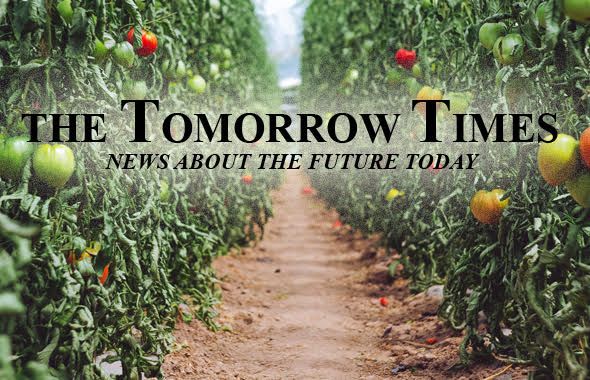Alongside your monthly update of systemic sustainability news, the May edition of the Tomorrow Times explores the global developments surrounding food security, sustainability, and innovation in the agricultural sector.
Food is the elixir of life on earth. Agriculture sustains our society and cuisine is one of the most pristine forms of cultural articulation for civilizations around the globe. Food is also a unique expression of complex, interconnected systems which affects, among others: health, value chains, power relationships, waste streams, biodiversity and the ecosystems which supports it all.
Global food production networks are taking a bite out of the very systems which sustain them, creating the necessity to innovate new sustainable models. In this edition of the Tomorrow Times, we highlight a number of developments contributing to the creation of more sustainable food production systems which are levelling up global food security.
Follow these periodical monthly updates of tomorrow’s sustainability news today, by subscribing to the Tomorrow Times.
Food security
- Food security is the “challenge of the century." Speaking before researchers and policymakers around the world, Cornell professor Chris Barrett addresses threats to food security as an “existential crisis for the planet,” as “land, water, and marine resources are growing more limited.”
- Agroforestry takes the global stage. Emmanuel Torquebiau, keynote speaker at this years World Agroforestry Congress 2019 argues that agroforestry – a practice that combines trees with shrubs, crops and livestock in a system that produces food, supports biodiversity, builds soil horizons and water tables, and sequesters carbon from the atmosphere – is the ultimate agricultural practice.
- The potential of aquaponics. Edenworks, New York’s most biodiverse indoor farm, is on a mission to replace today's globalized food supply with aquaponics, an ecosystemic approach to indoor farming: aquaponics combines aquaculture (farmed fish) and hydroponics. “In terms of sustainability, we use no added fertilizer and no chemicals, and generate no runoff from our agriculture or fish farming.”
- Arid agriculture. Except is currently working on multiple projects across the Middle East to increase food security and local production in arid areas. Our concept; Serenity Farms is a repeatable ‘stamp’ design, producing the annual fresh food nutrition needs for over 60.000 people.
- Food waste tech. Sustainably feed 10 billion global citizens by 2050 will be an unachievable goal if food loss and waste remain between 30 and 50 per cent of annual food production. Food waste reduction must become a central pillar of our larger food security and sustainability strategy
- EU called to policy action on lab-grown meat. Europeans are consuming meat at “unsustainable levels” and should be encouraged by European Union (EU) policymakers to take up lab-grown meat in order to tackle climate change, researchers from London-based think tank Chatham House warn.
Energy & Environment

- Big Food is pushing the government for a price on carbon. Due to the interconnected nature of the food industry and the natural environment, the Sustainable Food Policy Alliance are lobbying the U.S. Government for stronger climate policy.
- Buy organic to help ecosystems thrive. Organic food is among the leading actions people can take to curb the global decline in insects, according to scientists from the International Union for the Conservation of Nature.
- Marine heatwaves threaten global biodiversity and the provision of ecosystem services, killing swathes of sea-life like “wildfires that take out huge areas of forest,” scientists reveal.
Business & Economy

- Closing the Loop. The world's first feature length documentary on the zero-waste circular economy, Closing the Loop, was released for free on Youtube this month. The inspiring film is presented by global sustainability expert Prof. Dr. Wayne Visser, in collaboration with Emmy and two time Telly Award winning director Graham Ehlers Sheldon.
- Former Unilever CEO builds business cases for Sustainability. Paul Polman actively seeks cooperation to implement sustainable business strategies and drive systemic change. Among the other, Polman expresses his thoughts on permaculture and regenerative agriculture.
- Sustainable tourism enables organic farming. Huertaluna project seeks to make Galapagos a Slow Food Travel Destination, exploring how travellers can have a positive impact and raise the bar of what “good tourism” really means.
Science, Technology & Design

- Smart Farming 4.0, first pilot in Indonesia. Demographics, scarcity of natural resources, climate change, and food waste as four main development challenges on agriculture. To address them, Smart Farming 4.0 is applied in a pilot project in Situbondo, East Java, with technologies such as Agriculture Drone Sprayer (pesticide and liquid fertilizer), Drone Surveillance (land mapping), and Soil and Weather Sensors (ground and weather sensors).
- How to convert CO2 into furniture, drugs, and plastics? Researchers have found a way to convert carbon dioxide into plastics, fabrics, and other useful products more efficiently and cheaply than possible before. Scientific publications about the topic can be found in the Journals Energy & Environmental Science and Nature.
- BMW says it will "emerge winner" of electrical vehicles. BMW says that it is hiring 2,000 more people at its Dingolfing factory in a push to "emerge winner" in the auto industry’s transition to electric and autonomous vehicles.
Urban Environment

- Building future cities in the Middle East. A new downloadable report from MEED, in partnership with Mashreq, examines how the construction industry is approaching urban development .
- Apartment-building incorporates 500m2 urban farm. Along the waterfront on New York’s north shore, a millennial-friendly residential space includes 571 units, 35,000 square feet of commercial space and something a little unusual for an apartment complex: a massive urban farm.
Unexpected and Intriguing

- Chinese factory uses 1 billion cockroaches to eat 55 tons of food waste a day. Aside from turning roaches into livestock feed, the company also explores the possibility of using them for diet pills and high-protein cosmetics. The company chairwoman Li Hongyi says “It is like turning trash into resources.”
- Japanese Minimalism promotes happiness. By owning less there is less to organize, fewer chores, fewer decisions to make and more time to focus on yourself and your work - VIDEO.
Have you seen a news item suited for the Tomorrow Times? Let us know and we'll consider including it in the next edition.
May 1, 2019

